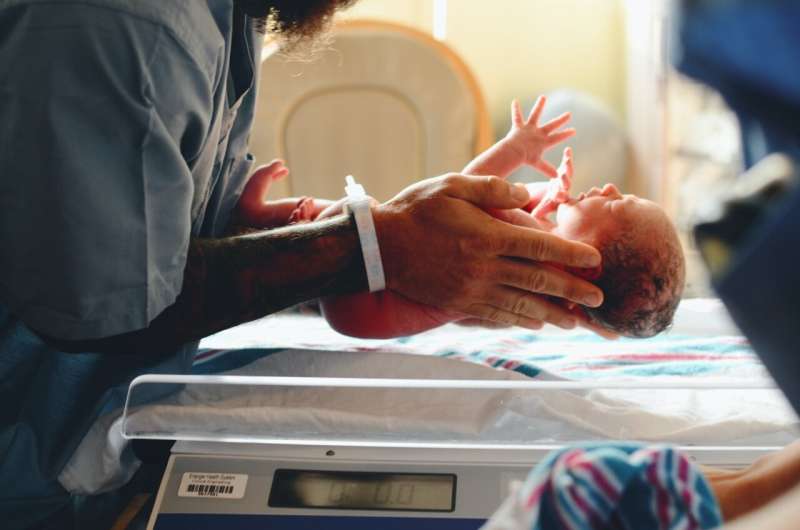This article has been reviewed according to Science X's editorial process and policies. Editors have highlighted the following attributes while ensuring the content's credibility:
fact-checked
peer-reviewed publication
trusted source
proofread
Infants born to COVID-infected mothers found to have triple the risk of developing respiratory distress

New UCLA-led research finds that infants born full term to mothers who were infected with COVID-19 during pregnancy had three times the risk of having respiratory distress compared with unexposed infants, even though they themselves were not infected with the virus. The risk was significantly lower when the mothers infected during pregnancy were previously vaccinated.
The researchers found that in-utero exposure to SARS-CoV-2 sparked an "inflammatory cascade" in the infants, increasing the risk of a breathing disorder that most often strikes prematurely born infants.
The findings are published January 24 in the journal Nature Communications.
"We found unusually high rates of respiratory distress shortly after birth in the full-term babies born to mothers who had COVID-19 during pregnancy," said senior author Dr. Karin Nielsen, professor of pediatrics in the division of pediatric infectious diseases at the David Geffen School of Medicine at UCLA. "The mothers had not been vaccinated prior to acquiring COVID, indicating that vaccination protects against this complication."
To trace how respiratory distress develops following in-utero exposure to SARS-Cov-2, the researchers conducted a study called proteomics that examines the structure and functions of proteins and how they affect cells. They found that whip-like structures called motile cilia that help clear mucus from the respiratory tract did not function normally in the exposed infants stricken with respiratory distress. In addition, the infants had higher production of antibodies called immunoglobulin E (IgE).
Of the 221 mothers enrolled in the study, 151 (68%) were unvaccinated prior to infection, with severe or critical COVID-19 disease present in 23 women (16%), compared with only three (4%) of vaccinated mothers. The researchers found that 34 (17%) of 199 exposed infants followed in the study had respiratory distress, which is a very high frequency, as in the general, unexposed population respiratory distress happens in 5% to 6% of babies only. Of babies with respiratory distress, 21% were born to mothers with severe or critical COVID-19, while only 6% of babies without respiratory distress were born to women with severe disease, a finding that was statistically significant.
Of the 34 infants with respiratory distress, only five (16%) were born to mothers vaccinated prior to infection, compared to 63 (41%) without the breathing disorder, indicating that vaccination had a protective effect. According to the researchers, even one mRNA vaccine dose prior to infection significantly reduced the odds that a full term infant would develop respiratory distress.
"Not only do our results show higher rates of RD [respiratory distress] in SEU [SARS-CoV-2 exposed uninfected] infants when compared to the general population," the researchers write, "but we observed more cases of RD at later gestational ages than anticipated, when neonates should presumably have more mature lung anatomy."
The study has some limitations. Most of the participants were enrolled from a large tertiary and quaternary medical center, which typically receives the sickest patients, and several mother/infant pairs were transferred from small community hospitals around the county due to illness severity, so the findings may be skewed toward more severe COVID illness than what might be found in the general population.
The researchers did not have data on the effect of COVID infection prior to vaccination or of vaccination after infection, which may affect maternal disease severity and its effect on fetal development. Also, the results should be interpreted with caution due to the small sample size.
More information: Respiratory distress in SARS-CoV-2 exposed uninfected neonates followed in the COVID Outcomes in Mother-Infant Pairs (COMP) Study, Nature Communications (2024). DOI: 10.1038/s41467-023-44549-5



















